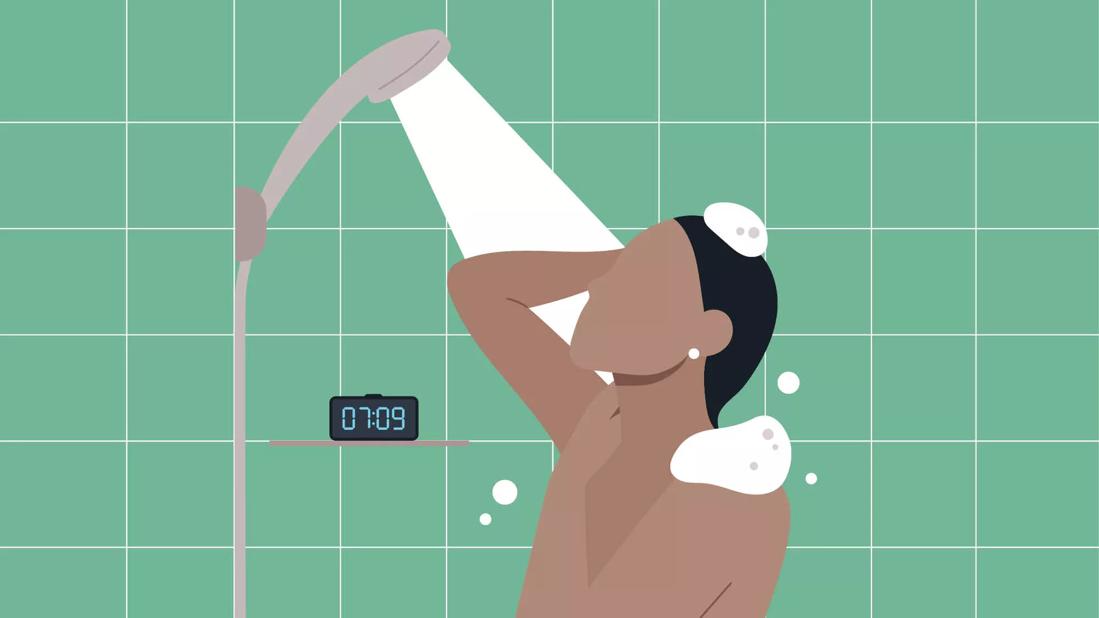It’s a wash — when you bathe is a personal preference

Image content: This image is available to view online.
View image online (https://assets.clevelandclinic.org/transform/da9150bf-48db-4bb1-9769-416a21058e5b/Shower-Night-Morning-1570150946-967x544-1_jpg)
person showering
You’ve probably debated whether it’s better to be a morning person or a night owl among your friends and family.
Advertisement
Cleveland Clinic is a non-profit academic medical center. Advertising on our site helps support our mission. We do not endorse non-Cleveland Clinic products or services. Policy
And you might have had a similar argument about when’s the best time to shower: Morning or night.
You may have an inclination for one over the other — and that’s OK.
“There’s no definitive answer for the global population on whether to take an evening vs. morning shower,” says dermatologist Alok Vij, MD. “But for each individual, there tends to be a right answer. And it’s all based on preference.”
Dr. Vij explains if it’s better to shower at night or in the morning and the benefits of both.
Should you shower at night or in the morning? If you need help waking up before you start your day, showering in the morning may be for you. Here are some of the pros of showering in the a.m.:
Advertisement
A fan of showering at night? It may be something you’ve done your entire life.
“One of the recommendations from the Society of Pediatric Dermatology and the American Academy of Pediatrics is for parents to bathe their kids at night from infancy to help establish a normal sleep cycle,” explains Dr. Vij.
Here are some of the pros of showering in the p.m.:
If you have eczema, you may have heard that showering at night is better. But Dr. Vij says it’s really a personal preference.
“For people with eczema or sensitive skin, it’s recommended that you apply your daily moisturizers and any topical prescription or over-the-counter products twice a day,” he clarifies. “And it’s not necessarily better to shower at night or morning, as long as you’re using gentle cleansers, moisturizers and prescription products as recommended.”
Regardless of whether you shower in the morning or at night, you may do your best thinking while lathering up.
“Your mind tends to get creative when it’s idle,” explains Dr. Vij.
But you don’t want to linger too long under the stream of hot or cold water. Dr. Vij says your shower should last between five and 10 minutes.
“You want to use warm water instead of hot water and apply gentle skin cleansers instead of harsh soaps,” he advises. “Also, you want to avoid products with fragrances, dyes and lots of natural preservatives and then, make sure to moisturize as soon as you get out of the shower before your skin is completely dry.”
And when it comes to those bed sheets, does showering in the morning or at night help keep them cleaner longer?
“It’s a wash,” says Dr. Vij. “Regardless of when you shower, you should wash your sheets on a regular basis. You’re still going to deposit a lot of dead skin cells, accumulated overnight sweat, bacteria and oils. Fungus is going to live there. There’s all sorts of contaminants and pollutants in your bed whether you take a shower beforehand or not.”
So, is it better to shower at night or in the morning? Overall, Dr. Vij says figuring out the best time to shower is up to you — and may be worth a little experimentation.
Advertisement
“Everyone gets stuck in their routine about what they like. Experiment to find your favorite version of yourself — if you’ve always showered in the morning, maybe try the opposite for a week and see how it makes you feel. And if it makes you feel awesome, then stick with it. And if not, go back,” recommends Dr. Vij.
“There’s no right time to shower. It’s whatever makes you feel your best. It’s such a personal choice that you should do what suits you and do what makes you happy.”
Advertisement

Sign up for our Health Essentials emails for expert guidance on nutrition, fitness, sleep, skin care and more.
Learn more about our editorial process.
Advertisement
Bathing once a day is the general guidance, but you could also have reasons to soap up twice a day or not at all
You’re sharing your sheets with dust mites, bacteria and lots of dead skin, so you’ll want to keep your bedding fresh
You may notice itching, redness and swelling after wearing or using laundered items
We don’t fully understand how cleanliness impacts immune system development, but we do know that preventing illness is important
An icy blast may boost mental clarity, increase circulation and give your skin a little glow — but don’t overdo it
This olive oil-based soap is generally mild and safe when diluted
Try turning the heat down on the water and opting for a moisturizing soap
Research doesn’t show a link between the personal hygiene product and breast cancer
Although it could be used as a moisturizer, this new trend is not recommended
Communicating clear limits helps protect your time, energy and emotional well-being
High cholesterol can be genetic, but testing and treatment can lower your heart disease risk